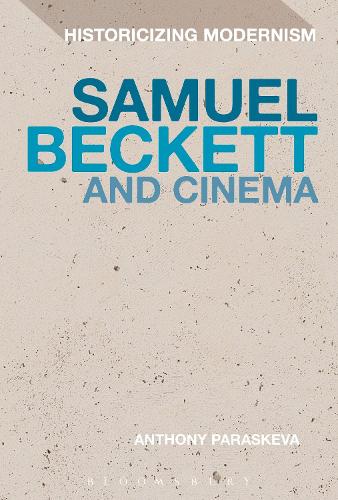
Samuel Beckett and Cinema
(Hardback)
Available Formats
Publishing Details
Samuel Beckett and Cinema
By (Author) Anthony Paraskeva
Bloomsbury Publishing PLC
Bloomsbury Academic
23rd February 2017
United Kingdom
Classifications
Tertiary Education
Non Fiction
Literature: history and criticism
Literary studies: c 1900 to c 2000
791.43
Physical Properties
Hardback
208
Width 156mm, Height 234mm
463g
Description
In 1936, Samuel Beckett wrote a letter to the Soviet film director Sergei Eisenstein expressing a desire to work in the lost tradition of silent film. The production of Becketts Film in 1964, on the cusp of his work as a director for stage and screen, coincides with a widespread revival of silent film in the period of cinemas modernist second wave. Drawing on recently published letters, archival material and production notebooks, Samuel Beckett and Cinema is the first book to examine comprehensively the full extent of Beckett's engagement with cinema and its influence on his work for stage and screen. The book situates Beckett within the context of first and second wave modernist filmmaking, including the work of figures such as Vertov, Keaton, Lang, Epstein, Flaherty, Dreyer, Godard, Bresson, Resnais, Duras, Rogosin and Hitchcock. By examining the parallels between Becketts methods, as a writer-director, and particular techniques, such as the embodied presence of the camera, the use of asynchronous sound, and the cross-pollination of theatricality and cinema, as well as the connections between his collaborators and the nouvelle vague, the book reveals how Becketts aesthetic is fundamentally altered by his work for the screen, and his formative encounters with modernist film culture.
Reviews
By examining a vast array of early European films that Beckett is known to have seen from the 1930s onward, Paraskeva makes even Becketts latest and shortest works shine with newly found intertextual brilliance a truly remarkable contribution to Beckett Studies especially in Paraskevas intrepid research through loads of European films. * James Joyce Literary Supplement *
Paraskeva draws on a rich archive of existing scholarship in his book Close analysis of Beckett's growing familiarity with the technologies, techniques and institutions of screen media helps it to make what may be the most detailed case yet for Beckett the serious cineaste. * Times Literary Supplement *
Paraskeva successfully realizes the goal of exploring the various influences of first and second wave modernist cinema on Becketts work and directing practice. Through his thorough, incisive, and engaging analysis and methodical comparison, Paraskeva provides us with a great read not only of Becketts oeuvre but also of the other examples present in his research, and his diligently researched book should be considered necessary reading for anyone wishing to study Becketts work for film and television. * Studies in 20th and 21st Century Literature *
A very solid and interesting addition to Beckett scholarship in an area that has been mostly overlooked. * Modern Language Review *
There is ... a wealth of imaginative commentary here that makes for some productive and revealing scholarship. * Journal of British Cinema and Television *
Paraskevas book succeeds in providing a fascinating account of Becketts awareness of modernist film techniques and showing how he adopted them in his stage plays and teleplays. This monograph is clearly the product of a passion for modernist film culture, a thoughtful engagement with Beckett criticism, and a careful examination of Beckett drama in relation to film techniques. * Journal of Modern Literature *
A fascinating and impeccably researched study of the impact of first and second wave cinema on Becketts writing and direction [The book] allows the reader to completely reevaluate film history stratigraphically and non-chronologically through Beckett ... A must-read. * Modernism/Modernity *
The sheer amount of material on offer in Samuel Beckett and Cinema, as well as the numerous connections drawn between Becketts works and cinematic history, will ensure that any future studies on this subject will do well to begin here. * Modernist Cultures *
Author Bio
Anthony Paraskeva is Senior Lecturer in the Department of English and Creative Writing at Roehampton University, UK. He is the author of The Speech-Gesture Complex: Modernism, Theatre, Cinema.
